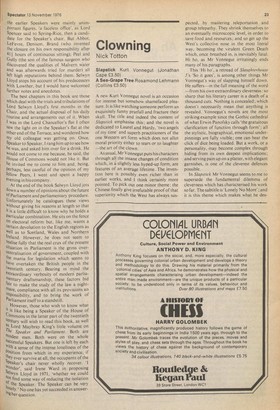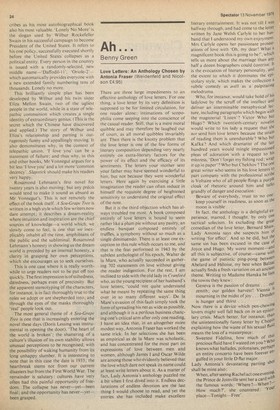Clowning
Nick Totton
Slapstick Kurt Vonnegut (Jonathan Cape E3.50) A Sea-Grape Tree Rosamond Lehmann (Collins £3.50) A new Kurt Vonnegut novel is an occasion for intense but somehow shamefaced pleasure. It is like watching someone perform an exquisitely funny pratfall and fracture their skull. The title and indeed the content of Slapstick emphasise this; and the novel is dedicated to Laurel and Hardy, 'two angels of my time' and superb practitioners of the one Western art form which does not allot moral priority either to tears or to laughter —the art of the clown.
As usual, Mr Vonnegut puts his characters through all the insane changes of condition which, in a slightly less hyped-up form, are features of an average lifetime. The invention here is possibly even richer than in earlier works, and I think certainly more pointed. To pick out one minor theme: the Chinese finally give irrefutable proof of that superiority which the West has always sus
pected, by mastering teleportation and group telepathy. They shrink themselves to an eventually microscopic level, in order to save food and resources; and so get up the West's collective nose in the most literal way, becoming the virulent Green Death which, once breathed in, is inevitably fatal. Hi ho, as Mr Vonnegut irritatingly ends many of his paragraphs.
This 'Hi ho', a retread of Slaughterhouse 5's 'So it goes', is among other things Mr Vonnegut's way of slapping himself down. He suffers--in the full meaning of the word —from his own extraordinary cleverness: so sharp that his literary career is a death of a thousand cuts. Nothing is concealed; which doesn't necessarily mean that anything is revealed. Vonnegut's novels are the most striking example since the Gothic cathedral of what Erwin Panofsky calls 'the gratuitous clarification of function through form': all the stylistic, biographical, emotional underpinnings are fully visible; one can hear the click of dice being loaded. But a work, or a personality, may become complex through hiding from its own deepest implications; and serving pain up on a platter, with elegant garnishes, is one of the cleverest defences possible.
In Slapstick Mr Vonnegut seems to me to supersede the fundamental dilemma of cleverness which has characterised his work so far. The subtitle is 'Lonely No More': and it is this theme which makes what he des cribes as his most autobiographical book also his most valuable. 'Lonely No More' is the slogan used by Wilbur Rockefeller Swain in his successful campaign to become President of the United States. It refers to
his one policy, successfully executed shortly before the United States collapses as a political entity. Every person in the country is issued with a randomly-selected, new middle name—'Daffodil-1 l', 'Oriole-2' which automatically provides everyone with a new extended family numbering tens of thousands. Lonely no more.
This brilliantly simple plan has been developed by Wilbur and his twin sister Eliza Mellon Swain, two of the ugliest people in the world, while in a state of telepathic communion which creates fa single identity of extraordinary genius. (This is the secret which the Chinese have discovered and applied.) The story of Wilbur and Eliza's relationship and parting is outrageously funny and appallingly moving. It also demonstrates why, in the context of telepathic union, 'I love you' can be a statement of failure; and thus why, in this and other books, Mr Vonnegut argues for a bit less 'I love you' and a lot more 'common decency'. Slapstick should make his readers very happy.
Rosamond Lehmann's first novel for twenty years is also moving; but any précis would tend to make it sound as absurd as Mr Vonnegut's. This is not remotely the effect of the book itself. A Sea-Grape Tree is written in a high style which few writers now dare attempt; it describes a dream-reality where intuition and inspiration are the chief sources of knowledge—a world which, we slowly come to feel, is one that we inexplicably inhabit all the time, amphibians of the public and the subliminal. Rosamond Lehmann's honesty in showing us the dream world is preceded by an internal honesty, a clarity in grasping her own perceptions, which she encourages us to seek ourselves.
This is one case where it is really worthwhile to urge readers not to be put off too quickly. The first impression is of stiltedness, datedness, perhaps even of preciosity. But the apparent stereotyping of the characters, for instance, is in fact thoroughly true to the roles we adopt or are shepherded into; and through the eyes of the masks thoroughly 'real' people look out.
The most general theme of .4 Sea-Grape Tree is one that is increasingly entering the novel these days (Doris Lessing was instrumental in opening the door). 'The heart of the world is broken'; the shattering of a culture's illusion of its own stability allows unusual perceptions to be recognised, with the possibility of waking humanity from its long unhappy slumber. It is interesting to note that in this case the date is 1933; the heartbreak stems not from our current disasters but from the First World War. The remainder is salutary : cultures have very often had this painful opportunity of freedom. The collapse has never—yet—been final; and the opportunity has never—yet-been grasped.



































 Previous page
Previous page